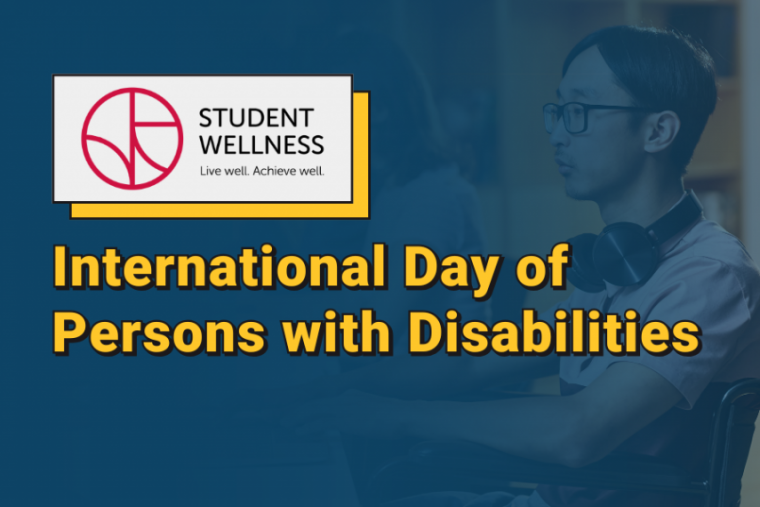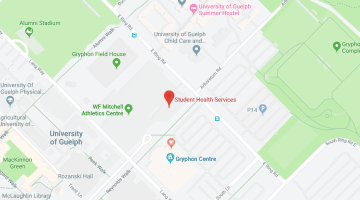

First proclaimed in 1992 by the United Nations, International Day of Persons with Disabilities (IDPWD) is recognized and celebrated on December 3rd annually. The observance of IDPWD aims to promote an understanding of disability issues and mobilize support for the dignity, rights and well-being of persons with disabilities. This year's theme is "United in action to rescue and achieve the SDGs for, with and by persons with disabilities".
What is a disability?
6.2 million Canadians have a disability – that's 22% of people aged 15 and older! Disabilities disproportionally affect women, trans and gender non-confirming folks, and most people with a disability (71%) have more than one. Disabilities may include those that are permanent or temporary, and they are not always visible. Examples include:
- Learning disabilities
- Attention deficit/hyperactivity disorder (ADHD or ADD)
- Hearing and/or vision impairments
- Autism Spectrum Disorder
- Chronic medical conditions, such as pain disorders
- Recovery from a significant injury
- Dexterity or mobility impairments
- Mental health conditions
- Acquired brain injuries, including concussions
According to the National College Health Assessment (2022) [1], the top 5 disabilities that U of G students reported experiencing were: ADD/ADHD (12.7% of students), learning disability (5.7%), blind/low vision (3.4%), autism (2.9%), and mobility/dexterity disability (1.8%).
How does the University of Guelph support students with disabilities?
Student Accessibility Services (SAS)
The University of Guelph supports students with disabilities through several services, primarily Student Accessibility Services [2], which is part of Student Wellness Services. SAS helps students who experience disabilities to experience full and equitable participation in academic life and strives towards creating a barrier-free environment where all students have the opportunity to achieve their potential.
The primary mandate of SAS is to help students with academic accommodations, and to remove structural barriers when a disability is affecting the student's academic functioning. Common accommodations include writing tests in the exam centre, the use of ASL interpreters or screen readers and volunteer note-taking to facilitate equitable access to learning and the opportunity to demonstrate learning outcomes. Accommodations vary from person-to-person, and an SAS Advisor works collaboratively with students and instructors to determine what is needed for each situation.
In addition to 1-on-1 support with an SAS Advisor, SAS also offers programming for learning writing and problem-solving strategies, group programs for students with autism, and peer-based support through an orientation week event called START Accessible. Learning to Bounce [3] is an academic resiliency group that supports students struggling with procrastination, perfectionism, anxiety and other mental health and ADHD-related barriers to schoolwork.
Students who experience disabilities but are not currently accessing inclusive services on campus can register with SAS for the Winter 2024 semester by filling out an SAS Application Form [4].
Disability-Inclusive Initiatives at the University of Guelph
The University of Guelph is committed to fostering an educational, working, and living environment, where all University community members experience an authentic sense of inclusion and belonging. The U of G has a long-standing commitment to accessibility, equity, diversity, and inclusion on our campuses. The 2022-2027 Strategic Plan: Our Time [5], outlines the commitment to "Transforming our University through Indigenization and equity, diversity, and inclusion." Part of Inclusive Excellence is a shared commitment to an accessible and oppression-free campus, including the places we learn, live, work, visit, and research.
Inclusive Technology on Campus
Library Accessibility Services (LAS) [6] provides a number of adaptive technologies to assist students, including text-to-voice screen readers such as Kurzweil 300 and Jaws, Mindomo visual thinking program, Sonocent audio notetaker, and Dragon Naturally Speaking voice-activated writing tool. LAS also sources and creates alternative text materials (e.g. audio, Braille, large print and electronic versions of course-required textbooks) and lends out equipment such as smart pens, tablets, and audio recorders. Students can access LAS through Student Accessibility Services.
Digital Accessibility Resource Centre (DARC) [7] provides training for students, staff & faculty on how to create and maintain accessible digital content. DARC offers a free course on Courselink, monthly and on-demand training sessions, as well as pre-recorded trainings and newsletters. This service may be of particular interest to student clubs who create and share digital content on social media or websites.
Inclusive Opportunities on Campus
Experiential Learning Hub [8] supports students with disabilities entering the workforce through coaching on disclosing disabilities, navigating interviews, and job-related accommodations. ELH offers 1-on-1 support with Career Advisors, and also works with a number of community partners that connect students with disabilities to local employers.
Admission Services [9] promotes accessibility for incoming students by collaborating with Student Accessibility Services during the admission process.
Inclusive Design on Campus
BlindSquare Initiative [10]: The University of Guelph was the first Canadian post-secondary institution to install a complete electronic way-finding system called BlindSquare to help blind and visually impaired people find their way around campus, both inside and out.
Accessibility is a core priority in the University's renovations around campus. Recently, the new entrance to the Maclaughlin Library was designed to promote accessibility, and the ongoing Mackinnon renovation project will also have a number of accessible upgrades.
Sources:
Statistics Canada: Measuring Disability in Canada (2022) [11]
National College Health Assessment (2022) [1]
United Nations: International Day of Persons with Disabilities [12]
